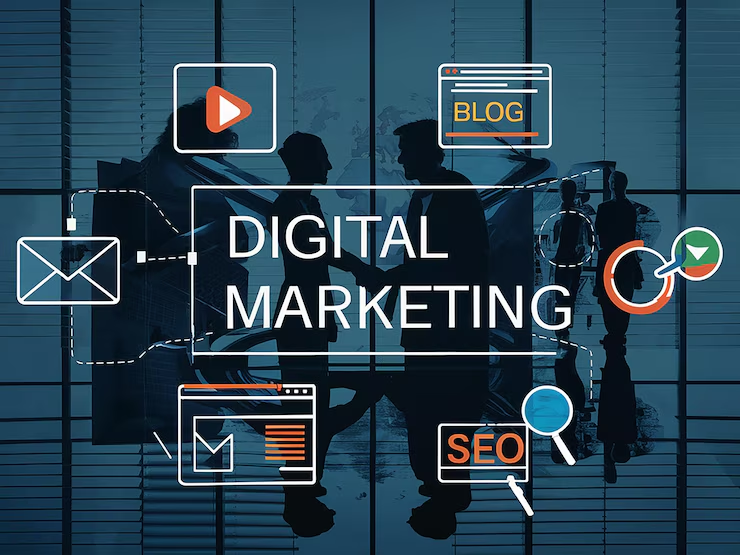Introduction to Selling Digital Marketing Services Online
Selling digital marketing services online has emerged as a lucrative business opportunity, driven by the growing importance of online presence for businesses. In an age where the internet dictates consumer behavior, companies are investing more in digital marketing to stay relevant and competitive. This escalating demand for online visibility has created a robust market for digital marketing services, encompassing everything from search engine optimization (SEO) and social media marketing to content creation and email campaigns.
The advantages of selling digital marketing services online are manifold. Firstly, the potential customer base is vast and diverse, transcending geographical limitations. This broad reach allows service providers to tap into varied markets, from local small businesses to international corporations. Secondly, the overhead costs associated with running an online digital marketing business are significantly lower compared to traditional brick-and-mortar establishments. Expenses on physical office space, utilities, and in-person meetings can be minimized, funneling more resources into enhancing service quality and customer satisfaction.
Another key advantage is the unparalleled flexibility that comes with an online business model. Digital marketers can operate from virtually anywhere, enabling a work-life balance that is often unattainable in conventional office settings. This flexibility also fosters a dynamic work environment, allowing for collaboration with a global talent pool and the ability to adapt swiftly to market changes and client needs.
The objective of this blog post is to provide a comprehensive, step-by-step guide on how to successfully sell digital marketing services online. Whether you are a seasoned professional looking to expand your reach or a newcomer eager to break into the industry, this guide aims to equip you with the knowledge and strategies needed to thrive in the competitive digital marketing landscape. From identifying your niche and building a strong online presence to effectively pitching your services and retaining clients, we will cover all essential aspects to ensure your venture into selling digital marketing services online is both successful and sustainable.
Identifying your target market is a crucial step in successfully selling digital marketing services online. Understanding who your potential clients are and what they need allows you to tailor your services and marketing efforts effectively. Conducting thorough market research is essential to pinpoint potential clients, which can range from small businesses and startups to larger corporations in need of digital marketing support.
Market research begins with gathering data on potential clients. This involves analyzing industry trends, competitor strategies, and customer demographics. Utilize both primary and secondary research methods. Primary research includes surveys, interviews, and focus groups, while secondary research involves reviewing industry reports, market studies, and existing data. These methods will help you identify the specific needs, pain points, and goals of your target audience.
Once you have collected sufficient data, the next step is to create buyer personas. Buyer personas are fictional representations of your ideal clients. They are based on real data and help you understand your clients’ behaviors, motivations, and challenges. To create effective buyer personas, consider factors such as age, gender, location, job title, company size, and digital marketing needs. Additionally, delve into their pain points, goals, and the solutions they are seeking. This comprehensive understanding enables you to craft personalized marketing messages and service offerings that resonate with your target market.
Understanding your target market also involves recognizing the different segments within it. For instance, small businesses may seek cost-effective solutions and guidance on how to establish their digital presence. Startups might focus on rapid growth and scaling strategies, while larger corporations could require sophisticated and customized digital marketing plans. Tailoring your services to meet these varied needs will enhance your appeal to each segment.
In summary, identifying and understanding your target market through meticulous market research and the creation of detailed buyer personas is fundamental to selling digital marketing services online. This approach ensures that your marketing efforts are relevant, targeted, and more likely to convert potential clients into loyal customers.
Defining Your Service Offerings
When selling digital marketing services online, it is crucial to clearly define your service offerings to attract potential clients effectively. The array of services you can provide is vast, ranging from Search Engine Optimization (SEO) to social media management, content marketing, email marketing, Pay-Per-Click (PPC) advertising, and web design. Each of these digital marketing services plays a pivotal role in enhancing a client’s online presence and achieving their business goals.
SEO remains a cornerstone of digital marketing, focusing on improving a website’s visibility on search engines. This service can include keyword research, on-page optimization, link building, and technical SEO audits. Social media management, on the other hand, involves creating and curating content, engaging with followers, and analyzing performance metrics across various social media platforms to build brand awareness and drive engagement.
Content marketing is another essential service, emphasizing the creation of valuable, relevant content to attract and retain a target audience. This can be in the form of blogs, videos, infographics, and more. Email marketing, known for its high ROI, involves designing and executing email campaigns to nurture leads and maintain customer relationships.
PPC advertising is a service that focuses on driving traffic to a website through paid ads on search engines and social media platforms. It requires expertise in ad creation, targeting, and budget management to ensure a high return on investment. Lastly, web design is crucial for providing clients with a visually appealing and user-friendly website, which is foundational for any successful digital marketing strategy.
Creating service packages that cater to different client needs and budgets is essential. For instance, you could offer basic, standard, and premium packages, each with varying levels of service and support. This approach not only makes your offerings more accessible but also aligns them with the diverse requirements of different businesses.
Staying updated with the latest digital marketing trends and tools is vital to ensuring your services remain relevant and competitive. The digital landscape is ever-evolving, and keeping abreast of new techniques, algorithms, and platforms will enable you to provide cutting-edge solutions to your clients.
Building a Professional Online Presence
Creating a professional and trustworthy online presence is crucial for selling digital marketing services effectively. The first step in this process is building a user-friendly website that serves as the cornerstone of your online visibility. Your website should clearly showcase your range of services, highlight your expertise, and feature client testimonials to build credibility. Ensure that the website is easy to navigate, mobile-responsive, and optimized for search engines. This not only enhances user experience but also improves your site’s visibility in search engine results.
In addition to your website, maintaining an active presence on social media platforms where potential clients are likely to be is essential. Platforms such as LinkedIn, Facebook, Twitter, and Instagram can be powerful tools for engaging with your audience and showcasing your work. Regularly posting relevant content, sharing industry insights, and interacting with followers can help you establish authority in the digital marketing space.
Professional branding plays a significant role in creating a cohesive and recognizable online presence. Invest in a professional logo that reflects your brand identity and choose a color scheme that resonates with your target audience. Consistent messaging across all online platforms, including your website, social media profiles, and email communications, is key to reinforcing your brand image. This consistency helps in building trust and recognition among potential clients.
Finally, don’t underestimate the power of content marketing. Regularly publishing high-quality blog posts, case studies, and whitepapers can demonstrate your expertise and provide value to your audience. This content not only drives traffic to your website but also positions you as a thought leader in the digital marketing industry. By integrating these elements—an optimized website, active social media presence, professional branding, and valuable content—you can build a strong and professional online presence that attracts and converts potential clients.
Creating Compelling Marketing Content
In the competitive landscape of digital marketing, creating content that attracts and engages potential clients is essential. A well-rounded content strategy can demonstrate your expertise and the value of your services, ultimately driving conversions and client acquisition. Different types of content, such as blog posts, case studies, whitepapers, and videos, each serve unique purposes and can cater to various stages of the buyer’s journey.
Blog posts are a cornerstone of content marketing. They allow you to address common pain points, share industry insights, and offer actionable tips. Consistently publishing high-quality blog content can position you as a thought leader and improve your website’s search engine rankings. Implementing SEO best practices, such as keyword research, meta descriptions, and internal linking, ensures your content reaches the right audience.
Case studies and whitepapers are invaluable tools for demonstrating your success and expertise. Case studies provide real-world examples of how your digital marketing services have positively impacted clients, showcasing measurable results. Whitepapers, on the other hand, offer in-depth analysis and research on specific topics, highlighting your knowledge and analytical capabilities. Both types of content can be leveraged to build trust and credibility with potential clients.
Videos are another powerful medium for engaging your audience. They can be used for tutorials, client testimonials, or showcasing your service offerings. Video content is highly shareable and can significantly boost your online presence. Incorporating videos into your content strategy can lead to higher engagement rates and better audience retention.
Content marketing strategies should also include the use of client testimonials. Positive testimonials from satisfied clients can serve as persuasive social proof, reassuring potential clients of your effectiveness and reliability. Featuring these testimonials prominently on your website and social media channels can enhance your brand reputation.
In summary, creating compelling marketing content involves a mix of various content types, adhering to SEO best practices, and leveraging client success stories. By doing so, you can effectively attract and engage potential clients, demonstrating the value of your digital marketing services.
Leveraging Online Marketing Channels
In today’s competitive digital landscape, effectively leveraging online marketing channels is crucial for promoting digital marketing services. Utilizing a diverse range of channels can help reach a broader audience, generate leads, and convert them into clients. Each platform offers unique opportunities and requires tailored strategies to maximize their potential.
Social media advertising is a powerful tool for reaching a vast audience. Platforms like Facebook, Instagram, LinkedIn, and Twitter provide targeted advertising options that allow you to focus on specific demographics, interests, and behaviors. Crafting compelling ad creatives and using persuasive copy can drive engagement and lead generation. Regularly analyzing metrics such as click-through rates (CTR) and conversion rates helps refine your approach and optimize ad performance.
Google Ads, another critical channel, enables you to appear in search results when potential clients are actively looking for digital marketing services. By bidding on relevant keywords and creating targeted ad campaigns, you can attract high-intent traffic to your website. It’s essential to continuously monitor your ad spend, quality scores, and conversion data to ensure a positive return on investment (ROI).
Email marketing campaigns remain a cornerstone of digital marketing. Building a segmented email list allows you to send personalized messages that resonate with different audience segments. Crafting engaging subject lines, providing valuable content, and incorporating clear calls-to-action (CTAs) can significantly boost open and click-through rates. Automation tools can streamline the process and ensure timely follow-ups, nurturing leads through the sales funnel.
Influencer partnerships can also amplify your reach and credibility. Collaborating with influencers who align with your brand values can introduce your services to their engaged followers. Whether through sponsored posts, reviews, or co-created content, influencer marketing can drive brand awareness and trust. It’s vital to choose influencers whose audience matches your target market and to measure the impact of these collaborations through engagement and conversion metrics.
Tracking and analyzing the performance of your marketing campaigns across these channels is paramount. Use analytics tools to measure key performance indicators (KPIs) such as traffic sources, conversion rates, and customer acquisition costs. Understanding what works and what doesn’t allows for data-driven decisions, ensuring continuous improvement and success in selling your digital marketing services online.
Building Relationships and Networking
In the digital marketing industry, building relationships and networking are pivotal for success. Establishing strong connections with potential clients, industry influencers, and fellow digital marketers can significantly enhance your business’s visibility and credibility. One of the most effective platforms for networking is LinkedIn. By creating a compelling profile and actively participating in discussions, you can connect with key figures in the industry and showcase your expertise.
Industry forums and webinars are also excellent avenues for networking. These platforms allow you to engage in meaningful conversations, share knowledge, and stay updated on the latest trends and practices. Participating in these forums not only helps in building professional relationships but also positions you as a thought leader in digital marketing.
Joining professional groups, both online and offline, can further expand your network. These groups often host events and discussions where you can meet like-minded professionals and potential clients. Virtual events, in particular, have gained popularity and offer a convenient way to connect with a global audience. Attending these events can lead to valuable collaborations and referrals.
Maintaining good client relationships is equally crucial. Satisfied clients are more likely to provide repeat business and positive word-of-mouth referrals. Regularly communicating with your clients, understanding their needs, and delivering exceptional service can foster long-term partnerships. Personalized follow-ups and feedback sessions can also help in strengthening these relationships.
Networking and relationship-building are not just about making connections but nurturing them over time. Consistent engagement, genuine interest in others, and a willingness to offer value can significantly enhance your professional network. By leveraging online platforms, participating in industry events, and maintaining strong client relationships, you can effectively sell your digital marketing services and achieve sustained growth in the industry.
Closing Sales and Retaining Clients
Successfully closing sales and retaining clients are crucial components of selling digital marketing services online. To effectively close sales, it is vital to master the art of conducting successful sales calls and meetings. Begin by clearly presenting your digital marketing services, ensuring you highlight their unique benefits and how they can solve the client’s specific challenges. Tailor your approach to each client by thoroughly researching their business and industry beforehand. This personalized strategy will demonstrate that you understand their needs and are committed to providing tailored solutions.
Addressing client concerns is another critical step in closing sales. Be prepared to answer any questions they may have about your services, pricing, and the expected outcomes. Transparency is key; provide clear and concise information to build trust. When negotiating contracts, focus on creating a win-win situation where both parties feel satisfied with the agreement. Flexibility can be a valuable asset; consider offering customizable packages or scalable services that can adapt to the client’s evolving needs.
Setting clear expectations from the outset is essential for client satisfaction and retention. Outline the scope of work, timelines, deliverables, and any other relevant details in a formal agreement. This clarity helps to avoid misunderstandings and ensures that both parties are on the same page. Once the project is underway, delivering on your promises is paramount. Consistently meeting or exceeding client expectations will reinforce their trust in your services and increase the likelihood of long-term collaboration.
Excellent customer service is the cornerstone of client retention. Maintain ongoing communication with your clients through regular updates and reports. This not only keeps them informed about the progress of their campaigns but also provides an opportunity to demonstrate the return on investment (ROI) your services are generating. Regularly review performance metrics and be proactive in suggesting optimizations to improve results. By showcasing the tangible benefits of your digital marketing efforts, you can solidify your value proposition and foster enduring partnerships.
How to Start a Notary Business
How to Buy a Home in New York City: A Comprehensive Guide with Price Details and Examples
Mastering Facebook Login: A Comprehensive Guide
Louisiana Tech vs New Mexico State: Prediction and Analysis
How to Make Money Online: A Comprehensive Guide
Unlocking Opportunities: The Importance of Education and Training Jobs










